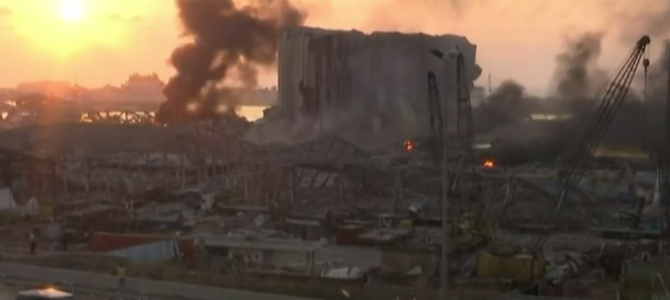
The massive explosion on Tuesday that destroyed the port of Beirut, killed more than 130 people, wounded thousands more, and ravaged part of the city, appears to be an accident. A warehouse storing 2,750 tons of ammonium nitrate that had been confiscated from a ship in 2013 and stored at the port ever since exploded after an adjacent building caught fire.
But it’s the kind of accident that could only happen in a place as mind-bogglingly corrupt as Lebanon. Simply put, Lebanon isn’t a failed state so much as a facsimile of a state. It has the features of a state—a government, a parliament, a bureaucracy—but none of it works.
Or rather, it works for the deeply corrupt political factions that run the country—a cartel class of religious and political sects that divvy up the functions of government to enrich themselves at the people’s expense. The leaders of these factions style themselves the leaders of political parties, but they’re more like feudal lords.
To put it in more familiar terms, Lebanon is a mafia state governed entirely through criminality and institutionalized corruption. The ranks of the civilian bureaucracy are filled according to sectarian quotas set by a political class that has no regard for the public good. Government jobs, contracts, and services are doled out according to this system, in which the strongest mafia family, the dominant sect that all others must placate and partner with at some level, is the Iranian-backed terrorist group Hezbollah.
If there’s one group that bears primary responsibility for the state of affairs in Lebanon that led to the explosion in Beirut, it’s Hezbollah.
I talked with Tony Badran, a research fellow at the Foundation for Defense of Democracies whose work focuses on Lebanon and Syria, and I asked him about Hezbollah’s role in governing Lebanon. He told me the terrorist group isn’t a parallel structure to the government, it is the government.
“Some say it’s a state within a state, which it is, but it’s also the state itself, it’s a part of the state,” he said. “But it’s not the al-Qaeda model. It’s not outside the state or the government. At the heart of the political system of Lebanon is Hezbollah. Ministers, lawmakers, administrators—all of them are involved with Hezbollah as both partners and in some cases as competitors.”
In this context, consider the explosion at the port. Hezbollah has long used the port for massive commercial scams and money-laundering. For years, the port of Beirut has been a hub of corruption, with a highly organized network for tax evasion and fraud that involves the country’s entire political class.
When shipments of cell phones or imitation designer-brand clothes come in from China, or rebar comes in from Iran, these goods are often brought in without customs tariffs or taxes and then sold below market price. And of course Hezbollah always gets a cut.
So no wonder the customs chief’s six letters sent to a judge beginning in 2014 warning about the ammonium nitrate were ignored.
What looks like fireworks going off before the large explosion at the #Beirut port. #Lebanon pic.twitter.com/D3PlidjjNA
— Joe Truzman (@JoeTruzman) August 4, 2020
It’s not just the ports. Last year, an ongoing garbage crisis that first exploded into public view in 2015 came to a head. As the country’s political elite argued over valuable waste-management contracts, uncollected trash filled the streets of Beirut, triggering a wave of protests. Two new landfills were hastily built near the coast but after three years were near capacity, with garbage piling up on the beaches and runoff going directly into the sea.
According to a New York Times report late last year, the problem was rank corruption:
The $288 million contract for one landfill went to Jihad al-Arab, the brother of an aide to the recently ousted prime minister, Saad Hariri, a Sunni Muslim. According to three people familiar with the company’s operations, it is adding water to the garbage containers that arrive each day to inflate their billable weight.
The other contract, worth $142 million, went to Dany Khoury, a Christian businessman said to be close to the family of President Michel Aoun, Lebanon’s top Christian leader. At this landfill, experts found, employees dumped trash and toxic waste directly into the Mediterranean.
It’s a similar story with power generation, sewage management, road construction—almost everything that traditionally falls to the government. At the center of all this corruption is Hezbollah, an organization that merges global terrorism, drug trafficking, and organized crime—and in recent decades, Lebanese politics.
The United States has played an ignoble role in Hezbollah’s rise. As part of the Obama administration’s effort to secure a nuclear deal with Iran, it derailed a major U.S. law enforcement campaign against Hezbollah headed by the Drug Enforcement Administration dubbed Project Cassandra.
According to an extensive report by Politico, the project “amassed evidence that Hezbollah had transformed itself from a Middle East-focused military and political organization into an international crime syndicate that some investigators believed was collecting $1 billion a year from drug and weapons trafficking, money laundering and other criminal activities.”
But allowing Project Cassandra to go forward would jeopardize the Iran deal, so the Obama administration undermined it as a matter of policy. At the same time, it advanced a policy of appeasement toward Hezbollah. Before he became CIA director under Obama, John Brennan advocated for “greater assimilation of Hezbollah into Lebanon’s political system,” and later said the administration was seeking to build up “moderate elements” in Hezbollah.
Project Cassandra members say the administration blocked their efforts to go after top Hezbollah operatives, investigate its envoy to Iran, or charge the group’s military wing as an ongoing criminal enterprise under federal racketeering laws. At every turn, the Obama administration protected Hezbollah.
Lebanon today, including the smoldering ruins of Beirut, is a dispiriting portrait of what happens when groups like Hezbollah are allowed to flourish and wield political power—and a powerful reminder that the United States should never encourage it.









